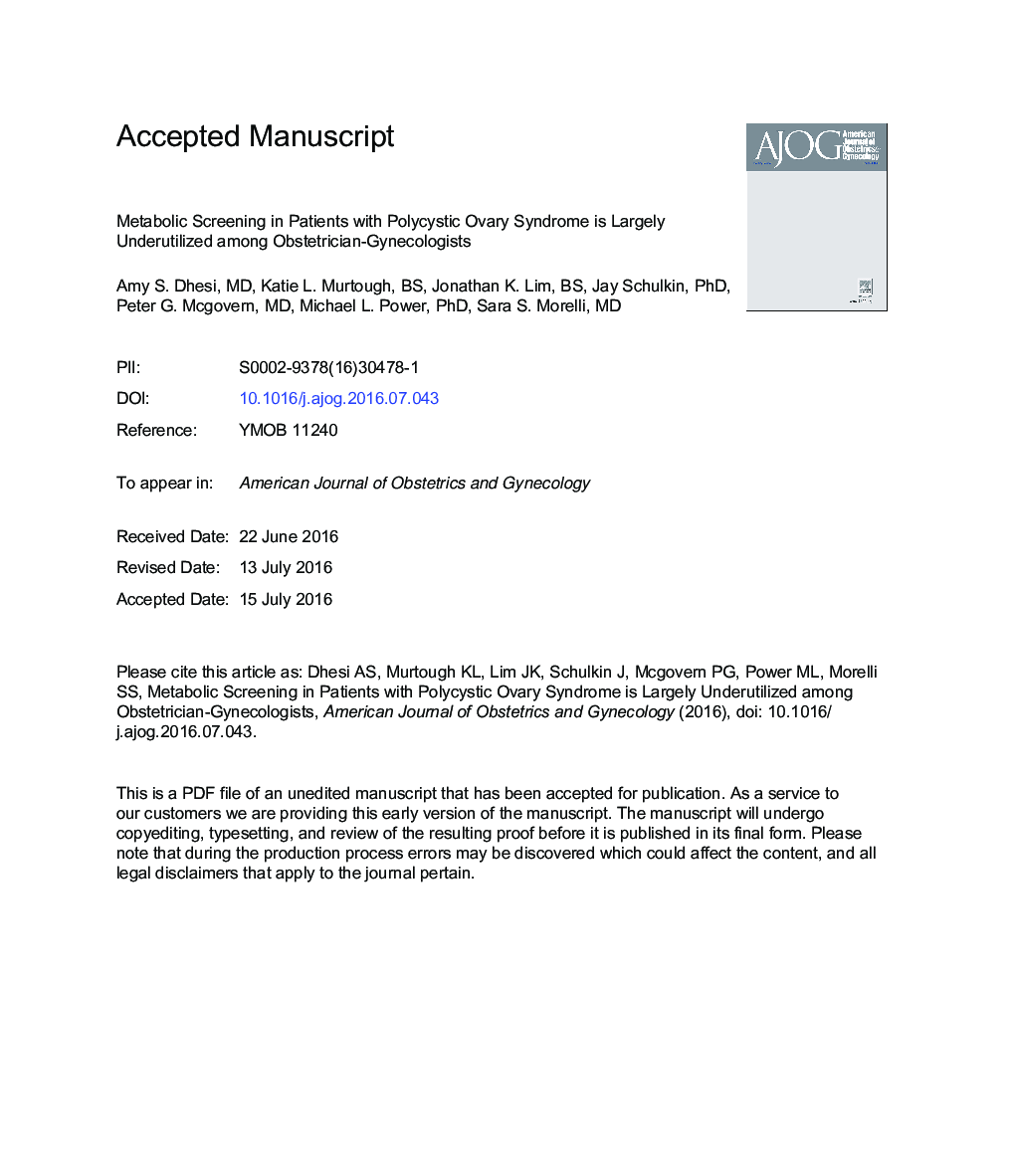| کد مقاله | کد نشریه | سال انتشار | مقاله انگلیسی | نسخه تمام متن |
|---|---|---|---|---|
| 5676117 | 1594884 | 2016 | 19 صفحه PDF | دانلود رایگان |
عنوان انگلیسی مقاله ISI
Metabolic screening in patients with polycystic ovary syndrome is largely underutilized among obstetrician-gynecologists
ترجمه فارسی عنوان
غربالگری متابولیسم در بیماران مبتلا به تخمدان پلی کیستیک؟ سندروم به طور عمده در زنان متخصص زنان و زایمان مورد استفاده قرار نگرفته است
دانلود مقاله + سفارش ترجمه
دانلود مقاله ISI انگلیسی
رایگان برای ایرانیان
کلمات کلیدی
دیس لپیدمی، تست تحمل گلوکز 75 گرم، اختلال تحمل گلوکز، پروفایل چربی، سندرم متابولیک، سندرم تخمدان پلی کیستیک،
موضوعات مرتبط
علوم پزشکی و سلامت
پزشکی و دندانپزشکی
پزشکی و دندانپزشکی (عمومی)
چکیده انگلیسی
Women with polycystic ovary syndrome have substantially higher rates of insulin resistance, impaired glucose tolerance, type 2 diabetes, dyslipidemia, and metabolic syndrome when compared with women without the disease. Given the high prevalence of these comorbidities, guidelines issued by the American College of Obstetricians and Gynecologists and the Endocrine Society recommend that all women with polycystic ovary syndrome undergo screening for impaired glucose tolerance and dyslipidemia with a 2 hour 75 g oral glucose tolerance test and fasting lipid profile upon diagnosis and also undergo repeat screening every 2-5 years and every 2 years, respectively. Although a hemoglobin A1C and/or fasting glucose are widely used screening tests for diabetes, both the American College of Obstetricians and Gynecologists and the Endocrine Society preferentially recommend the 2 hour oral glucose tolerance test in women with polycystic ovary syndrome as a superior indicator of impaired glucose tolerance/diabetes mellitus. However, we found that gynecologists underutilize current recommendations for metabolic screening in women with polycystic ovary syndrome. In an online survey study targeting American College of Obstetricians and Gynecologists fellows and junior fellows, 22.3% of respondents would not order any screening test at the initial visit for at least 50% of their patients with polycystic ovary syndrome. The most common tests used to screen for impaired glucose tolerance in women with polycystic ovary syndrome were hemoglobin A1C (51.0%) and fasting glucose (42.7%). Whereas 54.1% would order a fasting lipid profile in at least 50% of their polycystic ovary syndrome patients, only 7% of respondents order a 2 hour oral glucose tolerance test. We therefore call for increased efforts to encourage obstetrician-gynecologists to address metabolic abnormalities in their patients with polycystic ovary syndrome. Such efforts should include education of physicians early in their careers, at the medical student and resident level. Efforts should also include implementation of continuing medical education activities, both locally and at the national level, to improve understanding of the metabolic implications of polycystic ovary syndrome. Electronic medical record systems should be utilized to generate prompts for appropriate screening tests in patients with a diagnosis of polycystic ovary syndrome. Because obstetrician-gynecologists may be the only physicians seen by many polycystic ovary syndrome patients, particularly those in their young reproductive years, such interventions could effectively promote optimal preventative health care and early diagnosis of metabolic comorbidities in these at-risk women.
ناشر
Database: Elsevier - ScienceDirect (ساینس دایرکت)
Journal: American Journal of Obstetrics and Gynecology - Volume 215, Issue 5, November 2016, Pages 579.e1-579.e5
Journal: American Journal of Obstetrics and Gynecology - Volume 215, Issue 5, November 2016, Pages 579.e1-579.e5
نویسندگان
Amy S. MD, Katie L. BS, Jonathan K. BS, Jay PhD, Peter G. MD, Michael L. PhD, Sara S. MD,
